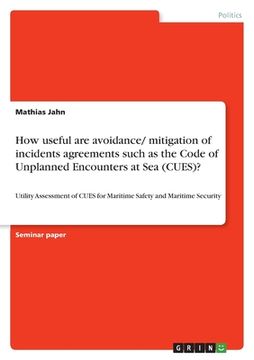How useful are avoidance/ mitigation of incidents agreements such as the Code of Unplanned Encounters at Sea (CUES)?: Utility Assessment of CUES for M (in English)
Synopsis "How useful are avoidance/ mitigation of incidents agreements such as the Code of Unplanned Encounters at Sea (CUES)?: Utility Assessment of CUES for M (in English)"
Seminar paper from the year 2022 in the subject Politics - Other International Politics Topics, grade: A, S. Rajaratnam School of International Studies, Nanyang Technological University (SAF-NTU Academy), course: Maritime Security Studies, language: English, abstract: How useful are avoidance/mitigation of incidents agreements such as the Code of Unplanned Encounters at Sea (CUES) in reducing the risks of conflict and building confidence in the Indo-Pacific waters? The Indo-Pacific waters and, therein, the South China Sea (SCS) qualifies as the "center of gravity in global geopolitics". Foremost due to its attributes as a disputed area of sovereignty/dominion, its rich flow/stock resources, and crucial sealines of communication for world trade. To peacefully manage SCS's MARSAF and MARSEC, the literature suggests that over the past political/military leaders have built a profound framework of "Maritime Confidence-building Measures" (MCBM) to improve "awareness" and "governance" on a "strategic, operational and tactical" level. In particular, through the collaborative "security communities" concept (e.g., ASEAN, ADMM, ADMM Plus, WPNS, MMCA) and "legally binding and nonbinding instruments" (e.g., COLREG, UNCLOS, CUES). In contrast, from 2010 to 2020, increased hegemonic Chinese military and grey zone activities as well as Vietnamese/Indonesian/Philippine/Thai (re)actions led to 73 deliberate ship rammings/ chasings/harassings among the parties. Between 2016 and 2018, China conducted 18 risky close-distance maneuvers toward U.S. naval vessels in the Pacific. These numbers suggest a practical discrepancy, "compliance" shortfall, and "unsafe" behavior by the signatories (in particular by China), raising initial doubts about the utility of the MCBM framework to achieve its safety/security purposes. To scope the essay to a workable set of SCS related research questions, it will examine to which extent the nonbinding CUES ('Independent Variable') did/will prove useful:

